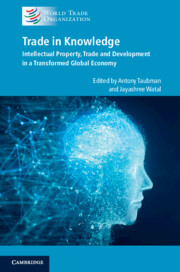Book contents
- Frontmatter
- Contents
- Figures
- Tables
- Contributors
- Preface
- 1 Thematic Overview: Charting the Evolution of Knowledge Flows
- Part I Conceptual Framework
- Part II Measuring Trade in Knowledge
- Part III Impact of Knowledge Flows on Trade and Development
- Part IV Policy, Regulatory and Legislative Frameworks
- Part V Looking Forward
- Index
2 - The Shifting Contours of Trade in Knowledge: The New ‘Trade-Related Aspects’ of Intellectual Property
from Part I - Conceptual Framework
Published online by Cambridge University Press: 17 February 2022
- Frontmatter
- Contents
- Figures
- Tables
- Contributors
- Preface
- 1 Thematic Overview: Charting the Evolution of Knowledge Flows
- Part I Conceptual Framework
- Part II Measuring Trade in Knowledge
- Part III Impact of Knowledge Flows on Trade and Development
- Part IV Policy, Regulatory and Legislative Frameworks
- Part V Looking Forward
- Index
Summary
This chapter charts the evolution and diversification of trade in knowledge that has taken place in the quarter-century since the WTO TRIPS Agreement came into force. Entirely new markets have come into being, potentially redefining the very character of ‘trade’. The disruptive effect of digital technology has led to much of the content – formerly conceived of as ‘added value’ embedded in physical carrier media, traded and measured as ‘goods’ – can be traded in the form of specific licences that use IP rights covering the content that is increasingly accessed online in digital form. These new forms of exchange in valuable intangible content confront fundamental assumptions about the nature of trade and its interaction with the IP system, forcing a rethink of what constitutes the ‘trade-related aspects’ of intellectual property. The issues examined include the principle of territoriality of IP rights and the segmentation of markets according to national jurisdictions; the structuring of cross-border commercial exchanges into the two discrete categories of ‘goods’ and ‘services’; the emerging disparity in regional trade agreements between provisions on digital IP standards and on digital products and e-commerce; and the significance of IP rights being treated as assets in investment treaties. Whatever formal or legal overlay is applied to these new trading arrangements – it is essential to understand that this is now trade in IP licences as such, rather than trade in goods that have an IP component as an adjunct or ancillary element. TRIPS came about at a time when economic growth theory incorporated intangible knowledge as an endogenous factor, rather than maintaining it as exogenous to models of growth. Trade policy must similarly work to incorporate an understanding of the trade in IP licences itself within cross-border commercial exchanges as an integral element of international trading relations: sale and licensing of IP rights can then be considered ‘endogenous’ to trade. This is essential for an accurate empirical picture of trade relations today, given the economic significance both of dispersed global value chains and of trade in ‘pure’ IP content as such particularly in the creative sectors.
- Type
- Chapter
- Information
- Trade in KnowledgeIntellectual Property, Trade and Development in a Transformed Global Economy, pp. 27 - 83Publisher: Cambridge University PressPrint publication year: 2022

